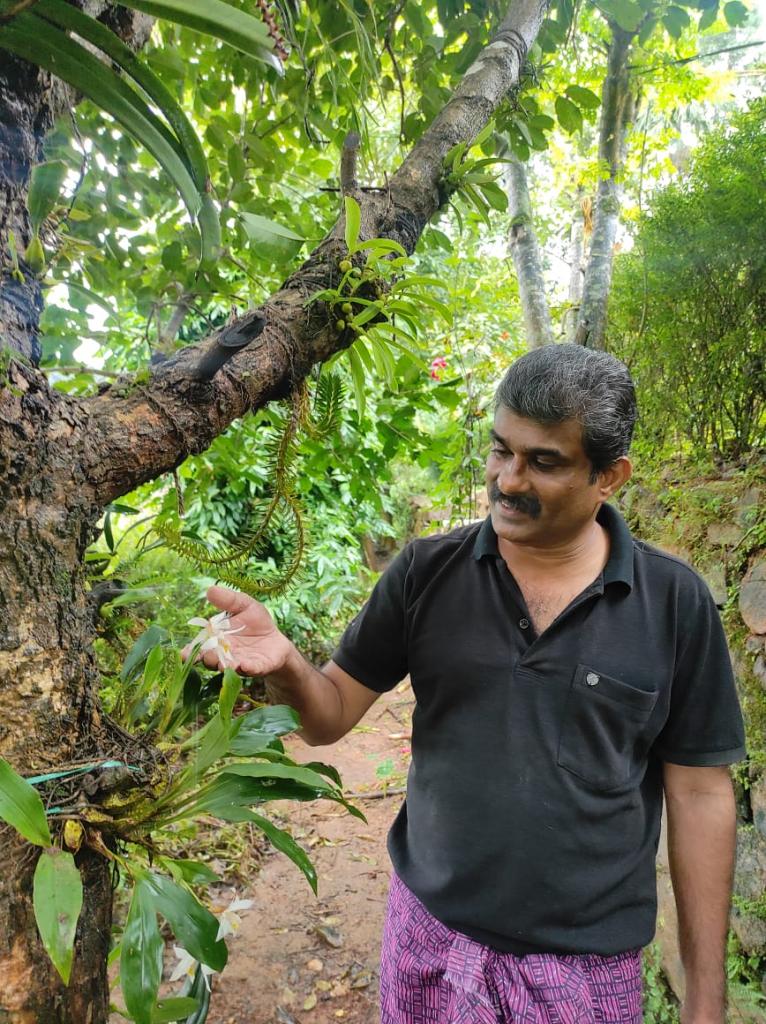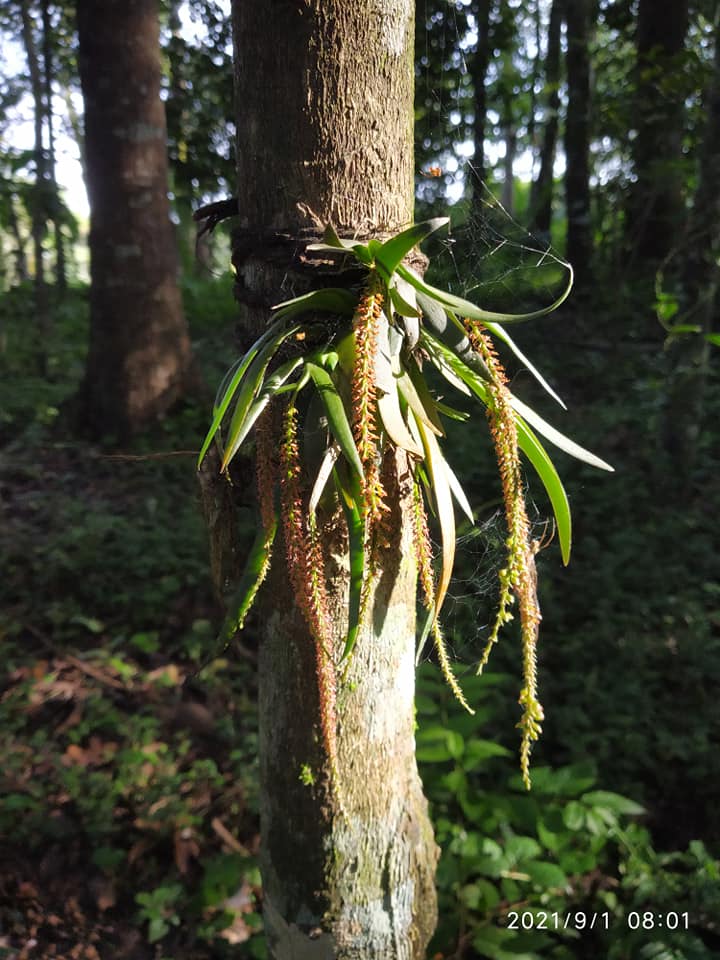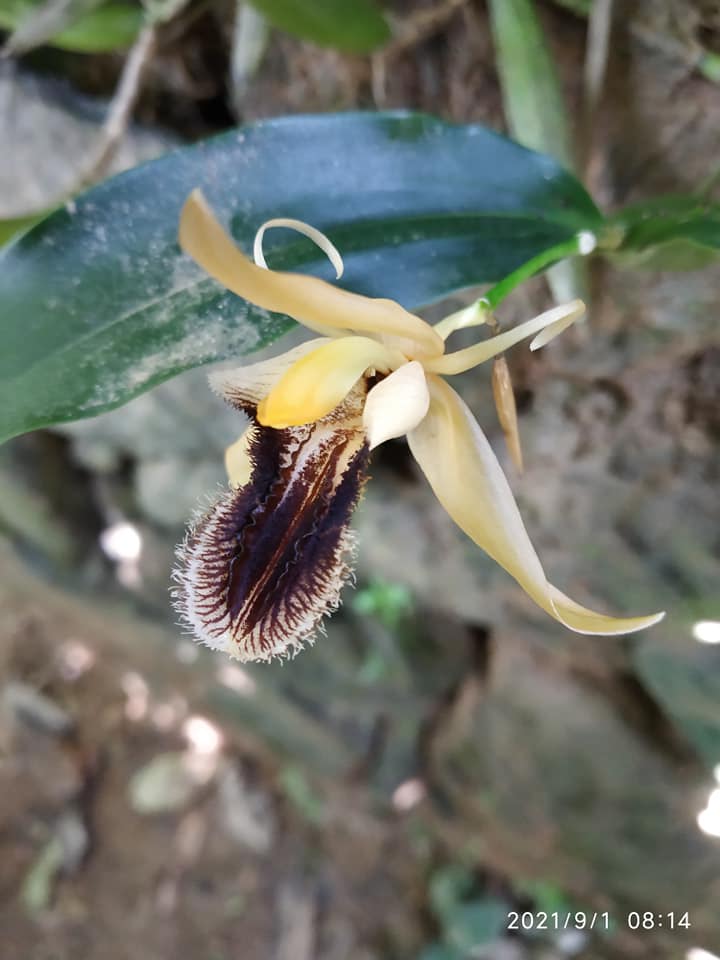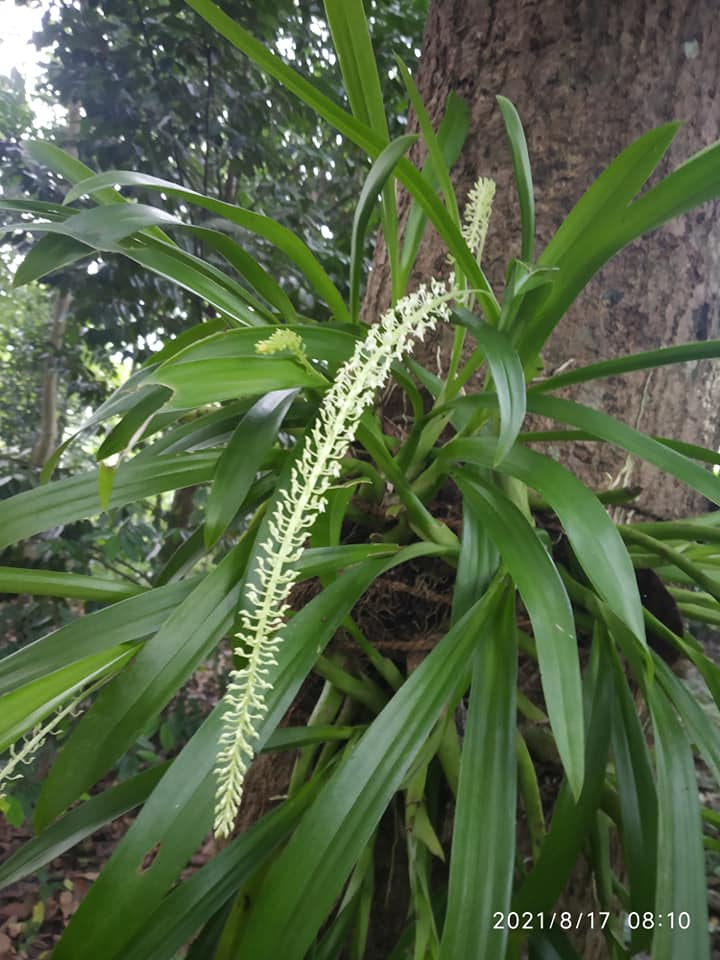Joseph John

Spread over one and a half acres of land, Nandakumar’s lush green coffee garden is a sight of its own as it harbours many rare and threatened plant species of Western Ghats. What makes this garden unique is Nandkumar’s passion for the conservation of Rare Endemic and Threatened (RET) plant species in his coffee garden along with the cultivation of many other fruits and lesser-known flora. This garden is being managed for the last 20 years in Madakkimala, a place near to Wayanad district headquarters. This unique collection consists of high valued medicinal plants, lesser-known fruit plants, bamboo varieties, leafy green vegetables of traditional importance and tuber crops in addition to the RET plant species. Each of these species is planted in this coffee garden with utmost care and consideration where evergreen and deciduous trees occupy their own unique space. Every plant has been properly tagged with its scientific name and common name so that even a child can easily understand the details. This garden rightfully embodies “science into practice” by a common man who has paid his earnest interest to conserve and protect the dying wealth. “I know that one-third of flowering plants are in the state of extinction and the changes in climate, increased human interventions are making the life of plants awful”, says Mr Nandakumar. It is high time to act as a conscious citizen to do his part to protect nature and its resources, he added.
Key Stone Species
The plants that can make a huge impact on the overall health and well being of the ecosystem are considered as the Keystone species and many of them are being conserved in Nandakumar’s garden. Plants such as Ficus religiosa (Arayal), Ficus benghalensis (Peral), Mesua feria (Nagapoomaram) and Hopea ponga (Kambakam) etc. are some of the species at the site. Altogether, the garden conserves 22 different keystone species that have been collected from various parts of the state. Among these Keystone species of plants in the garden, some have already passed more than 25 years and seasonal flowering and fruiting have allowed the plants in its full vigour to make successive generations. “Planting of these trees in the garden also helped attract many other species of plants and animals in the garden”, said Mr. Nandakumar. Many epiphytic plants, creepers and bryophytes find space to grow in these woods. Animals such as monkeys, squirrels, bats and fruit-loving birds are most common visitors on a daily basis. This makes the garden more lively and noisy too.
Germplasm of Dioscorea
The garden also serves as a germplasm centre for the Dioscorea species, in which 18 different yams are being conserved at the moment. Almost all varieties of Dioscorea alata are conserved in the garden, some of them are Chorakachil, Vellakachil, Uralankachil, Kaduvakkayyan, etc. Other species such as Dioscorea hispida, Dioscorea bulbifera etc are also protected in the garden. Since Dioscorea forms the potent source of starch, it acts as the main energy foundation for the tribal people of Wayanad. Mr. Nandakumar has a plan to collect almost all species of Dioscorea that are being used in Wayanad by tribal communities, however, the protection of the tuber crops from wild animals’ attack is an important matter of concern.
The Collection of Medicinal Plants
The garden has its own space for high-value medicinal plants as well and altogether 56 different species of plants are maintained in the garden. Aegle marmelos (Koovalam), Saraca asoka (Asokam), Commiphora caudata (Idinjil), Butea monosperma (Chamatha- flame of forest) etc. are some of the plants that are being managed in the garden. Shrubs are also being managed with Andrographis paniculata (Kiriyath), Plectranthus barbatus (Pani koorka), Sida acuta (Kurunthotti) Eupatorium triplinervum (Ayapana) etc. as some of the important ones. These plants serve as household remedies for many diseases such as fever, headache, stomach pain etc. People from the nearby areas also approach the garden to get plants whenever they are met with health issues but in most cases, people are inspired and starting to manage these plants in their own home garden. The efforts of Mr. Nandakumar paved way for several people to start their own garden in their home and the diversity of plants in their home garden significantly improved.
Lesser Known Fruit Trees
Varieties of fruit trees such as Syzigium zeylanicum (Njaval), Garcinia indica (Kudampuli), Baccauria courtallensis (Mutithooripazham), Artocarpus hirstus (Ayiniplavu) etc. are lesser known but have immense commercial potential. Altogether 12 such plants are protected in the garden in which many of them are bearing fruits and full maturity stage has already been attained. These plants species also attract many other living beings such as birds, bats, monkeys, squirrels and other insects. Thus planting these fruit trees could benefit not only human beings but other animals too by maintaining and conserving biodiversity.
Plants Against Poisonous Bites
Plants such as Alstonia venenata (Analivegam), Cipadessa baccifera (Kaypanarachi) and Aristalochia indica (Karalakam) are conserved in the garden since these species are long known to have a tradition of protecting humans against certain poisonous bites. Snakes, spiders, centipedes and other insect attack can be rightly prevented by the use of these plants. Many plant parts such as flowers, fruits, bark, roots etc. are used against the attack of these animals. Since Wayanad is home to many tribal communities, each of the tribes has separate set of plants for each of these bites and in different combinations. The garden conserves some of them because of the paucity of resources but it can also serve as the right source for providing specimens for detailed pharmacological studies in future.
CAbC, M.S. Swaminathan Research Foundation has provided its support by providing plants to this garden, “The personal efforts of a single person led to the conservation of a large number of species, popularization of conservation that marks Mr. Nandakumar as a Biodiversity Hero”. Such commendable work is an inspiration for everyone and deserves appreciation and acknowledgement from all corners of life.



